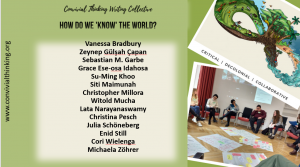The latest issue of Acta Academica contains the Special Focus: How do we know the world? Collective engagements with the (de)coloniality of development research and teaching.
The Special Focus was guest edited by the Convivial Thinking Writing Collective. Our collaborative engagements with the topic have evolved from a workshop in early 2019 and a consecutive blog series. Convivial Thinking is a collective platform seeking to surpass boundaries of origin, ethnicity, professional affiliation and academic disciplines in order to give space to inclusive, interdisciplinary and alternative approaches to mainstream methods of knowledge production, especially in the context of “development”. The articles in the Special Focus reflect these concerns.
Interrogating how we know the world
by Lata Narayanswamy and Julia Schöneberg
How do we ‘know’ the world? It is so vast a question that it feels, perhaps ironically, almost unknowable. Why does it matter? It is not a call to take an inventory of specific facts or perspectives, but is a question we ask in order to help frame a more critical and reflexive approach to the assumptions that underpin (academic) perceptions of WHAT counts as knowledge, HOW we capture and communicate that knowledge and WHO gets to both shape and present ideas as academic (read: expert) knowledge. Taken together, these reflections can, we believe, be very instructive and support more nuanced and critical approaches to social science scholarship.
This Special Focus is a continuation of encounters and conversations of a group of scholars and activists – in fact, most of us scholar-activists – who came together in a workshop to discover that we, regardless of our geographical or institutional background, share similar frustrations regarding how we participate in (re)producing (post)colonial divides in the way we teach, research and collaborate. The red thread of our collective engagement continues to be our wrestling with questions of power in all its nuances and especially in relation to: doing research and being researchers; conceptualising teaching; and building collaboration and community among our own academic hierarchical (oftentimes neoliberal) settings and with those we claim to research. These areas are not distinct but rather overlap in important ways and affect how and with whom we engage.

In bringing together this Special Focus, we have constituted ourselves as a Writing Collective, a processual challenge to the hierarchical tendencies of academic writing. It was important that we curated a process that embodied shared values of inclusivity, which was integral to our mission to challenge both what we know and how we know it.
This text is an excerpt of the introduction to the Special Focus. It is reproduced here under CC with attribution to Acta Academica.
Please read the full issue of Acta Academica Vol. 52 No 1. (2020).
Interrogating how we know the world – starting the conversation …
